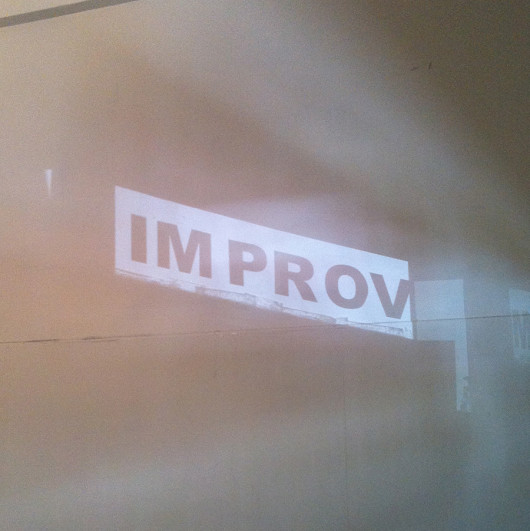Successfully Avoiding Anything Planned
How Improv Makes Me a Better Chaplain

In November of 2009, I became a full-time hospital chaplain and it’s no accident that by January 2010 I was enrolled in improv comedy classes. I think it was about week two…or hour two…that I realized I was going to need a healthy outlet to bring life balance to the intensity of the job. I was going to need a good dose of self-care as they encourage in the healthcare biz. I’m not sure being on an improv team called The Homewreckers is what they had in mind.

Throughout my day as a chaplain, I’m called into situations that range from someone just needing to talk to supporting a family who’s lost a loved one. I meet people from all walks of life trying to navigate the very challenging and often devastating realities they’re facing. I work as part of a multidisciplinary care team of physicians, nurses, social workers, and case managers, to bring hope and healing to people in their time of need. It’s extremely rewarding work, but at the same time…tough stuff man.
My thought was simple; find something extremely different from work that’s fun where I can meet new people and sing improvised show tunes hand in hand and cheek to cheek with total strangers ( wasn’t looking for that last one…but it happened…oh did it happen ). Improv was a perfect way to unwind after a long day, a way to receive so I could give. A place where inner silliness is encouraged and cultivated. It’s difficult, for example, to think about anything else when you’re on stage playing a spaceman in an antigravity dance contest.
The more I did improv, the more I realized how much of what I was learning applied directly to my work at the hospital (minus the moon boot cupid shuffle).
Just to be clear, I’ve never burst through a hospital door and asked for a suggestion from the audience. There are some boundaries to adhere to. But here are a few ways Improv has helped me become a better chaplain:
- Better Listener: In improv, you have to block out distractions and listen to what your scene partner is saying or you’ll end up on a farm when you’re supposed to be at a wedding. (Nothing against farm weddings). Improv made me a better listener, helping me identify what jolts me out of a conversation and to hone in more closely with people I’m meeting with.
- YES AND: I’ve learned the foundation of improv is agreement, the fuel for the funny. You can’t go anywhere with anyone on stage if you deny what they’re trying to create. It’s a way to step out in faith, trust each other, and see what you can come up with spontaneously. In the hospital so often I’ll have a preconception of how a person is thinking and feeling based on what’s happened even before they speak. Improv has helped me curb a tendency to preplan, giving space and appreciation to being and living in the moment. It’s helped me shed the need to bring too much with me into a new setting, and to be open to discoveries along the way.
- Build Confidence: So, here’s a fun fact. In chaplaincy, there are times when I don’t have a clue what I’m doing. Don’t tell anyone. Often I’ll get called and have little or no context to what’s going on. I respond to emergencies that allow minimal time for a detailed synopsis. These calls used to freak me out. And what do you know, they still do. I can’t say I’m totally comfortable with them now or ever will be, but improv has encouraged me to go blindly into the unknown with more confidence. Not so I can just get by, but to learn the deep value of relying on instincts in the moment. It helps you trust yourself and function well as a team player. If you can step out from the side of the stage and find yourself two seconds later on someone’s shoulders as the head of a talking caterpillar…well, it makes walking into chaos a little easier.

- Social Studies: Both In my work at the hospital and in improv there’s a lot of different people dynamics to be aware of. Anytime you walk into a room there are cultural traditions, family dynamics, and power struggles that come into play. In improv, you often have to choose quickly what these dynamics are, for instance, a scene between a tyrant boss and lazy employee or between a father and a daughter. Improv heightened my awareness of these dynamics and how important they are in helping someone in a difficult circumstance. Being in the hospital not only impacts the person but affects their entire family and social circle.
- Look for the Laughter: Improv has certainly encouraged me to look for opportunities to bring humor into even tough situations. People want to laugh, it’s a testament to human resilience. I still believe it’s the best medicine. It’s never far away when we’re open to it. One time a patient and I had a good laugh at the noises his bed was making every time he moved…a mix of high and low pitched squealing noises in short succession…sound familiar? I asked if he was sure it was the bed.
There’s a closer relationship between pain and comedy, laughter and counseling, improvised show tunes and chaplaincy than I certainly could have ever predicted. Often times we put these in separate camps and deem them opposites.
It’s helped me understand more deeply that when we’re going through difficult times, maybe we’re closer to laughter than we think.
(Top photo by Laughtrack Theater and middle and lower photo by improvhi www.hisketchfest.com)


Loved this!!